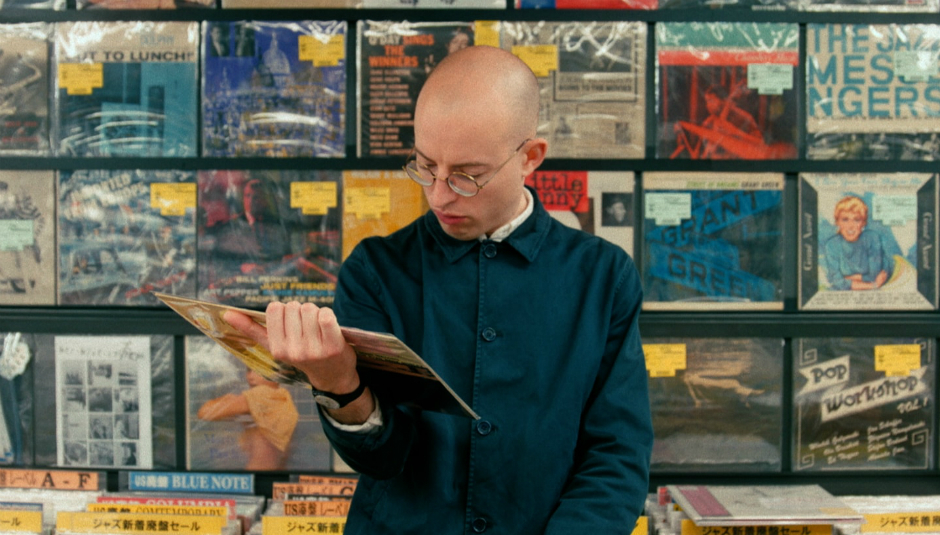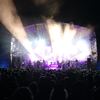Jack Steadman may be a known name to many and unknown to just as many, but his former band Bombay Bicycle Club made a big imprint on the musical world over the last 10-plus years. A group of teens at inception, Bombay Bicycle Club emerged from the cindering cocoon of the noughties guitar scene to become a technicolour band, au fait at writing cinematic anthems that, come their last album, managed to place bedroom crooner vocals and Snakefinger-inspired guitar hooks over a demagnetised-compass of world music rhythms while still remaining a commercially viable act – no mean feat in our attention-span deprived times.
And then, having seemingly conquered the world, they decided to stop.
In a twist to the usual band-fables of messy break ups and animosity, the band just decided they wanted to see what else was about, so Steadman took the opportunity to create Mr Jukes . Developed over the last few years, the resulting debut album, God First , shows a writer in love with the freedom of improvised jazz, the vicious drum sounds of early Gangster Rap, and the melodies of soul and funk. The album includes collaborations with De La Soul and Charles Bradley and, in short, with God First Jack got to live out every indie kid's dream, writing and performing with pioneers of the most influential musical force in the world, African-American music of the 20th Century.
As Jack prepares his band for their first full UK tour starting on 18 September in Brighton, we talked to him about Mr Jukes, where it came from and where he hopes it will go.
DiS: Firstly, I’m interested in the dividing line between Bombay Bicycle Club and Mr Jukes. You ended Bombay at its peak; how did it feel to end something as it reached the top of its arc?
Jack Steadman: It felt good. I mean we all agreed, it was a mutual thing. It was a really really good time to stop and it’s not, even though it’s a cliché for bands to be: “It’s not forever, it’s just a hiatus”, there’s no reason for it to be a permanent thing because none of us hate each other. It wasn’t even really a musical thing, I guess in a sense it was, but it’s more just about: "What else is there?" Which happens so often in life and it’s really unhealthy to just keep asking that question. So we said: “Fuck it, let’s see”.
We’ve been playing in Bombay Bicycle Club since we were 15 years old, which a lot of people probably don’t think about when they ask why did we stop. It’s a really huge part of your life taken up by this one thing. At that time I was 25, I felt quite young, and there were still so many things I wanted to do, musically and personally, and so that’s what we did.”
I agree 100% in that there’s an unhealthy fixation in remaining within the parameters of what we know…
For a band, it’s terrible to do that.
And I also think we’re encouraged to assume this thinking by societal messaging. So it must have been pretty exciting and nerve-wracking to be facing a "What’s next?" and breaking out of a comfort zone. Was Mr Jukes around at this point, or did you have to germinate it?
The name wasn’t there but I knew what the project was going to be. The only difference between Mr Jukes in its final form and what I’d been doing on the side, on the back of a tour bus on an MPC, is just time and resources. It’s the same beats, it’s the same love of jazz and funk and a love of sampling and early hip-hop, but rather than just quickly doing it when I have some spare time I dedicated two years to it and a healthy advance from a record label. So I could afford to get Charles Bradley on the record, and I could fly to the States to collaborate with people, I was afforded scope and that ambition.
That’s a big plus to have a team that has conviction in you from day one, or even pre-day one. So what was it like at first demo submission time to your first litmus-test colleague, be it the label or the manager or whoever?
I remember I did a whole bunch of things before sending it to the label. My manager, he’s been my manager since I was 15 so we’re very close, and he hears everything I do and he hears what my vision is. So we got together lots of tracks and they were almost pretty much done when we sent them to the label. I’ve always been quite distant with the label in a way. I feel they really trust me, and I think that’s because we’ve had quite a long relationship. And I’ve always just done things by myself with them, they’re very hands off to me with all the Bombay records and now Mr Jukes. So that’s been the way we work, so they don’t freak out if they don’t hear something for a while, they know I’m just working away. And then we sent them the ‘Grant Green’ demo, which didn’t have Charles on it, but was pretty much written and finished and they said to the effect "We can get behind this."
How was the collaboration experience, I know you’ve collaborated within Bombay Bicycle Club for example with Lucy Rose who, at numerous points, has had an intrinsic impact on your sound, but this is the next level, the real-life sample approach to collaboration. How was that?
It was a learning curve for me, for as you say I’m used to collaborating with friends and people I’ve met, and it’s very natural. Then all of a sudden I was on a plane going to meet Charles Bradley and having to record within half an hour of saying hello to him. But you have the confidence behind you of them really liking the track. So I’d be terrified if the first meeting was to play them the music, that would freak me out too much. So I did have a certain confidence in the music which made up for the lack of confidence that I generally have, on a personal level. And I think that happens a lot with musicians, that’s how you communicate. It’s easy to get along and you respect each other because of the music you’ve sent each other and you feel you can be equals to each other, no matter what stage in your career you are.
Did you meet De La Soul?
That was the on collaboration where I didn’t meet them. It was very last minute and we actually delayed the release of the album to get them on. We talked on the phone and even that was surreal for me, they were asking me what the song was about and what they should write the lyrics about and I could only think: "I wish I could do this every day, tell De La Soul what to write."
On the promo videos that were recently put online, the live set up looked very serene and balanced. How was the live recording process as your first sessions outside of Bombay Bicycle Club?
I’m obsessed with symmetry so that’s what I want to have in everything I do. It’s probably why I chose such a big band, so as I could have balance on two sides of the stage perfectly. The band that’s in that shot is actually a very recent band put together for the live shows, and don’t feature on the album - well a few of them do - but that’s my live band for the tour in September.
Playing with these guys is incredible. It’s just fun because I started off playing jazz, and I haven’t done it in so long. So at first I was almost nervous and intimidated by it as they’re incredible musicians and I’d forget where I am sometimes, and they’re nice about it, but it’s been so long since I’ve done that. But it feels great. The thing about when you go on tour for so long, and you’re playing a set, and you have such infrastructure around in terms of technicians and people helping you, it can make you feel like a bit of a baby sometimes. You’re still playing music and you’re still performing every night, but are you really pushing yourself? If something goes wrong you just go: “Whaa, fix my guitar”, and that’s just a technical level but even just musically, there wasn’t a lot of that excitement of when things go wrong and how to fix them, and that’s what made me fall in love with jazz and improvised music. So to go back to that now, I want things to go wrong because it’s fucking exciting and we’re talented enough to make it good.
Have you done any shows?
We did one at Village Underground, it’s a perfect sized room, it’s like 600 people and everyone was connecting with it, the atmosphere was great. That’s what I wanted, it felt good in the room. It was very unpretentious, people were just dancing and having a good time.
And is everything going well with the album since its release?
Yeah, I’m very happy. The response online seems to be really good and it’s got some nice reviews. I just want to play it live. As long as people come to the show I’m always happy, more-so than seeing the reviews you get on the record, which is weird because you spend all the time making the record. But this is a record that I want to play live, it’s the type of music that you want to see.
And, as with Bombay Bicycle Club, the Mr Jukes videos are great, what’s the story with these?
I felt like in this place I had a freedom to not need a consensus of four people on the visuals, so I wanted it to be what I like and my style. How better to explore that than with animation, where you’re not limited by anything? I wanted it to all be as trippy as Hell, that’s how I wanted it to be and that’s what I’m looking at when I make the music as well, that kind of stuff. I’ve got some friends who are really good animators, and know what I like so they made it as colourful and psychedelic as possible. We've got a new video which is me going into space, my first mission into a new interplanetary system.
You’re gonna’ go jam with Sun Ra…
Exactly, Sun Ra is one of my heroes.
God First is out now via Island Records. For more information about Mr. Jukes, including forthcoming tour dates, please visit his official website.






















